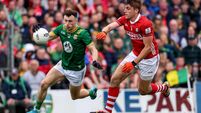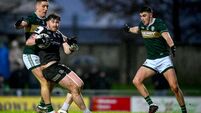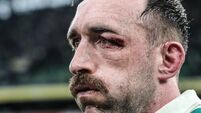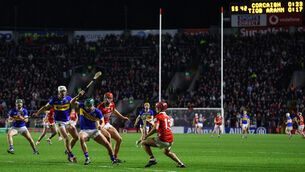Rob Heffernan never stands still

AST Sunday morning, less than 24 hours after returning from a night on the town in Dublin with Ryan Tubridy, Vogue Williams and the rest of the Late Late Show crew and guests, Rob Heffernan returned to the grindstone and the grassroots.
Out in the leafy surroundings of Fota Island, he put in his first serious walking session since finishing sixth in Rio, followed by a workout in the gym of the local resort hotel.
He had kept ticking over the previous couple of months, jogging, savouring the fresh air of one of the mildest Octobers he can recall.
Sunday morning, he was back to monitoring his stopwatch, having and hitting little targets, clocking each kilometre in five minutes, 10 seconds or less. Only days after a heartwarming medal ceremony for his performance in London in the summer of 2012, he’d taken the first steps on the road back to London, 2017.
After a shower and a bite to eat, he and his eldest son Cathal went along to Páirc Uí Rinn to take in the Blackrock U21 hurlers in a local county championship semi-final. Cathal hurls with the Rockies and plays football for their sister club, St Michael’s.
Heffernan Senior was a Nemo Rangers clubman growing up, being coached by the likes of Ephie Fitzgerald and worshipping and mixing with other local gods in his midst like Billy Morgan, Stephen O’Brien and Joe Kavanagh. Now he’s one himself out in St Michael’s. He’s a mentor with Cathal’s U12 team.
“I love it. I’ve always tried to be involved, but the last few months since I came home from Rio, I’ve been a lot more hands on. The big thing for me is to coach the kids individually; to go around and to speak to them individually.
"Otherwise, some of the kids who aren’t the stars won’t feel part of it. They all have different attributes and all develop different ways.”
Take his own son, Cathal. Already he’s a bull of a young fella, following the trajectory of all his uncles on his mother Marian’s side. So though Cathal is only 11, Rob will let him play with fellas two years older than him. That way he’ll have to develop his technical skills instead of relying on his superior strength.
Heffernan himself was the opposite. At 13 he stood only 4’7. At 17 he still looked like he was 13. Your quintessential late developer. To persist, he needed encouragement. He thrived on it.
When Brother John Dooley told him after a cross-country meet he was potential scholarship material, Heffernan’s view of himself and the world completely changed. So when he’s down in the club field in St Michael’s with the U12s, he’s very mindful a few words can make all the difference.

Looking at it now, he can see how his past informs his present and future. While writing his autobiography launched last week, Walking Tall, Heffernan found himself doing what Steve Jobs talked about in a famous graduation speech: connecting the dots.
It was only something he could do retrospectively. He couldn’t have done it looking forward, starting out.
There was nothing straightforward about his early career. His first international race required getting a passport which meant getting his hands on his birth cert. His mother kept fobbing the handover off until he was right up against the deadline. When he saw it, he was astonished. Devastated.
For 18 years he assumed his surname was Heffernan, same as his dad. On his birthcert he was registered as Robert Kiely. Who the f*** was Robert Kiely?
Turned out his parents hadn’t actually married. His mother had been married before, to a Kiely.
So when she gave her name as Kiely to the nurses at the time of Robert’s birth, they simply put his surname down as the same as hers, not his dad’s. At least that explained why there were no wedding anniversaries or photographs within the house.
Even after his shock discovery, the issue would remain something of a taboo in the family. His youngest sister only learned the same three years ago, that her mom and dad had never married.
“It’s mind-blowing, isn’t it?” says Heffernan, over a cup of coffee overlooking the banks of his beloved Lee. “But it’s Irish, isn’t it? We don’t talk about things like that. That’s probably why I’ve been so honest in the book. I’m trying to get away from that [mentality].”
He didn’t want that. He didn’t want to be like his dad. He loved him, of course; as a kid he’d go down to the local grotto and get down on his knees and pray for his father who had been months away working in England, away from his family, trying to provide for it.
Bobby Heffernan was a good, hard-working man, a plasterer who insisted on no bad language and no litter on his patch of a building site. But then he’d spend all his weekends out, drinking, playing darts, road bowling.
“I never wanted to be that,” says Heffernan. “All my life I spent trying so hard to get away from that.”
Rob Heffernan was different to Bobby Heffernan. Rob Heffernan wanted to roam. A tramp like him, he was born to run – or at least walk real fast.
But that route, even with all its dreams, involved weathering as much hardship as he ever would on any building site. At the European U23 championships, he finished second-last. He nearly gave up on the dream after that.
“I was completely depressed. Distraught. Because I was a young fella who had no understanding why I was depressed and had such a bad performance. But sure, I had raced six weeks in a row.
"Then partied after every single race, celebrating all the Irish records I’d set! Going out on the lash – sure, that’s normal for an Irishman to do! But it’s not f***n’ normal for a professional sportsperson to do! Then I’d feel so bad about being hungover the next day, I would then hammer myself by going back training really hard.”
Looking back, connecting the dots, he just lacked self-awareness. Experience. Guidance. All the things he has now. He always had talent. He just didn’t know how to apply it.
He recalls his first couple of years training with Robert Korzeniowski, a four-time Olympic gold champion, and his Polish compatriots. Heffernan knew he wasn’t in Korzeniowski’s league but he was more talented than most of his other training partners.
“Next thing the lads would be finishing in the top eight in the Olympics, sixth in the world championships and they’d be just laughing at me. Because of the structure. The support. Being away with physios. Non-emotional training.”
What was emotional training? Something he specialised in.
“The buzz, man! I’d be looking for the buzz! Training with Robert Korzeniowski and dropping him in the last 2k. In my head, I’d be rubbing my hands. ‘I beat the Olympic champion there!’ But sure, he didn’t care what I was doing.
"He’d a job to do on that day. The evening was a different session. Six months later there was another session planned. The way I plan it now. I could nearly write out my training for the next eight months.”
He’d learn from working with Korzeniowski that emotional training wasn’t the way to go, but after the 2009 Wworld Championships he’d learn that non-emotional coaching wasn’t the way either.
“It just wasn’t working with Robert. I was always second fiddle to [Olympic silver medallist] Paco [Fernandez]. Paco was always the star. I was there to help him. Robert was very elitist that way but I didn’t mind that.
"I was learning from them. But in Beijing, I noticed he only had eyes for Paco in the race, even though Paco only beat me by a few seconds. Then in Berlin when Paco dropped out, Robert left the course. When I was still racing, in eighth spot! After that, I was like ‘Naw, that’s not good enough...”
He now gets on great with Korzeniowski. When they now meet they can chat as virtual peers, equals. But back in the day, Heffernan was just a grasshopper. A subordinate. And Korzeniowski was just a prescriber of programmes. He wasn’t actually a coach in its truest, best sense.
Marian was. She wasn’t an expert on technique. She couldn’t dictate programmes to her husband or anyone else. Then again, she didn’t have to; by then Heffernan had learned enough from Korzeniowski to write them himself. What she knew was her athlete. When he needed a word of support. When he needed a stern word. And when he needed no words at all.
“In Moscow everything was perfect. Marian was on the drinks table. We had massive rows earlier that year, about what cues to use. She might have been saying ‘Rob! Concentrate!’, I’d interpret that as I wasn’t concentrating.
"Ray [Flynn] would be going ‘More arms.’ And I was going, ‘Ray, what do the hell do you mean, more arms?!’ So we spoke about every scenario and what cues to use. By Moscow there were times when I’d look at her and it would be just a nod. I’d know then that she knew everything was in control.”
In 2014 though it was different. After winning the World Championships in Moscow, he was asked to go everywhere. He allowed himself to be dragged everywhere. Marian could see it. He didn’t. He dropped out of the European Championships later that year, the one time the fighter’s fighter had quit fighting.
“I was going here and there, trying to set up the [Cork-based walking] academy, spreading myself too thin basically. And I’d have been saying, ‘Marian, I can do it, I can compartmentalise everything. I’m fine.’ And she’d be saying, ‘You can’t. You’re not focused. I know you.’ I’d fight tooth and nail with her over it, until later on, I’d realise, ‘Feck, she was right.’
“People put out these scenarios of perfect marriages and perfect relationships. Like, we were all looking at Angelina Jolie and Brad Pitt, thinking, ‘They have it all. Their marriage seems perfect.’ Next thing you hear they’re getting divorced!
"Perfection isn’t healthy for people. In a normal marriage, in a normal relationship, like a coach-athlete relationship, two strong people will have a difference of opinion and then you’ll work it out.”
That kind of respectful candour is something he finds is still not pervasive or even that welcome in Irish athletics.
Constructive criticism can be interpreted as criticism. Something negative. For someone who likes to get on with people but even more to achieve and compete, it’s caused quite some anguish, for him and for others. It needn’t be that way, though, he says. It shouldn’t be that way. Particularly from now on. Marian has gone back studying in UCC to upskill herself as a physical therapist. She’s no longer his coach.
For one last time he’s “going to war” next summer, for the World Championships, in London. To rage and win war, he’ll need a new structure. And when he suggests what it should be for him and for other athletes, he’d like if people weren’t so sensitive.
“People take it personal whenever I say anything about Athletics Ireland or the Sports Council or the [Sport Ireland] Institute. No. Firstly, the Sports Council provide me with my funding and I’m delighted with that, that’s great. But the practicality of it all, it’s disjointed.
“I went to get physio on my ankle a few weeks ago and the [Institute-accredited] physio wasn’t around until the following week. Now, that was no fault of hers, she was getting married and was spread thinly, but I was like, ‘I’m a world champion, an Olympic medallist. I need this sorted today, not next week.”
And so he had to pay one for out of his own funding, just like he’ll pay for the physios that accompany him every summer when he trains abroad. If he was training from Dublin like the boxing high-performance unit, that would be all taken care of.
After Moscow, he and his agent were in talks with Athletics Ireland with a view to founding an academy specialising in walking in Cork, the training base for him, Olive Loughnane and Gillian O’Sulllivan, World Championship medallists all. It amounted to nothing.
“If you’re up in Dublin, Sport Ireland is brilliant. Excellent. But if you’re over in Mayo, or down in Kerry or Cork, it’s a bit different.
“The mountain came to Muhammad for a while but then it cost too much to bring the mountain to Muhammad. There was a cost evaluation of the whole process, so then the mountain stayed at home!
“Again, when I point something like that out, I’m seen as the big bad man, being negative. But my actions are always positive. This is my practical application to stuff and what needs to be done to compete at this level.
"People take it personal. I’m like, no! I’m an expert in my field. I’ve proved it. I think I’m entitled to have that opinion when I’ve done it and seen the best do it, so why shouldn’t we have it? Don’t just provide something for three weeks of the year. We need it all year round. You know?”
So, right now, he’s putting together his team, his programme. He’s continuing to coach Brendan Boyce and Alex Wright. Last week he met up with Stuart Hogg, who would have coached Paul Hession, and occasionally, Marian herself, with a view to coaching him. Blocks are being put in place. One block though that he insists never has and never will be part of the programme he’s built is drugs.
In recent weeks he’s fielded questions about his continued friendship with Paco Fernandez, who back in 2008 was handed a two-year ban for a package found in his apartment. Then, as his book reveals, there was a visit from the drug tester last year after he woke up from undergoing a hip operation.
He tested positive for hydroxyethyl starch, a masking agent for EPO. It transpired it was merely used as a paracetamol in his operation and Heffernan was granted a retrospective TUE. Such an innocent explanation was still viewed by some sceptics as confirmation he couldn’t be clean.
Such inferences and accusations anguish him greatly.
“I didn’t need to reveal that [failed test episode]. Nobody knew about it, it didn’t come out. But I went through so much turmoil, I wanted to make sure the next time another athlete goes for an operation, to make sure they get a TUE (Therapeutic Use Exemption].
"Everyone goes on about the negatives of TUEs but what about the person who actually needs one and doesn’t get it?
“It was the hardest time of my life. I genuinely don’t think the doctor knew I needed to have a TUE beforehand. Athletics Ireland were saying I should have updated them about my whereabouts.
"Sure if I didn’t update them on my whereabouts, how could I have been tested? They also said I should have told them [the medics] I was a sportsman. They sent me on the operation! And I was chatting to the anaesthetist about all my races.
“Even bringing it up again here, it stresses me out more than anything else. I failed a drug test coming out of surgery and now people are saying... Get a grip, like!”
There is an inherent decency about Heffernan. Over the course of our chat in a Cork hotel, he goes to the effort and courtesy of calling the waitress Jenny, having noticed her name tag. He talks about taekwondo and the discipline it instilled in him: respect for everyone, and how it has carried through into his coaching of Cathal and the rest of the St Michael’s U12 team.
“If he shoulders a small fella fairly, that’s tough on the small fella; the small fella has other attributes he should be looking to use – run him, evade him, not go into physical contact. But if Cathal tripped him, I’d be disgusted. It’s wrong, it’s cheating, it’s dirty, it’s just not right.”
He’s remained friends with Fernandez. (“For one, he never failed a test. Two, there was a package intercepted for his apartment; there was no official documentation of what was found in that package. And third, he had been good to me. In 2006 when I was going to be put off funding and he won the European Championships, he helped me to loan a car in Quadix at the time. Paco getting caught up in that scenario was nothing to do with me.”)
But he says it’s a very perfect life you’ve lived if you’ve never had a friend or family relative who has carried out a misdemeanour. “You go into any nightclub in Cork and there’s people who will take drugs. I don’t think they’re doing it because I’ve never done it, it’s like a different world to me, even though I might be in the same nightclub. Then you’re going, ‘Jesus, is that really going on?’ Because you don’t see it yourself.
“There are people out there cheating on their wives. Again, I can’t relate to it. I just try to live my life the right way.”
It’s why Cork believes him. Loves him. Last Thursday week when he was presented with his 2012 bronze Olympic medal, there were 1,400 people crammed into City Hall for the ceremony. Ten times that figure had looked for tickets It was magical.
You could see the scattering heads around the hall when you walked in. Like, at one point I saw an old friend, Kevin Cummins. From Cummins Sports [Shop]. And right away I was thinking of Kevin on the high chair up in the corridor in Chríost Rí when we’d be race walking: ‘Jesus Christ, lads, push it on!’
“At one point, I came down to the door back stage and Frankie Sheehan was being interviewed about me and my role in sport to Cork. And it was like watching my own funeral! Everyone was so attentive, the seats were all full. It was like your funeral and This Is Your Life rolled into one!”
The dots all connected, but with even more dots to come.












